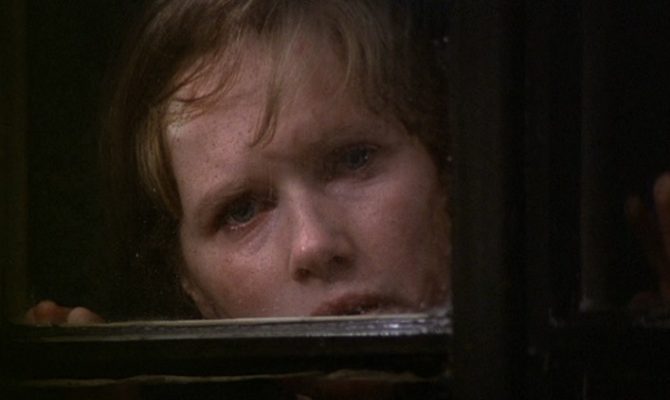Available on Blu-ray from Mon 3 Dec 2018
A curio in the illustrious filmography of the legendary Ingmar Bergman, The Serpent’s Egg is stuffed with his usual preoccupations: religion, fate and artistic demons, but is notable for being his only foray into Hollywood. Charged with tax evasion by the Swedish authorities, Bergman sought refuge in Germany. He implanted his exile status into the film through the character of his protagonist, but outside of his normal comfort zone his Midas touch was tarnished, with the result more curate’s egg than serpent’s.
In 1920’s Germany, Jewish-American Abel Rosenberg (David Carradine), a former trapeze artist and chronic alcoholic, traverses the squalor of poverty-stricken Berlin; frequenting the cabarets that continue defiantly in the face of economic collapse and the rising threat of Nazism. After the suicide of his brother he becomes close to Manuela (Liv Ullmann), the dead man’s fiancee, and is embroiled in a dark mystery.
Dark themes are standard in Bergman’s work. but unusually for the director, The Serpent’s Egg is an aimless drift through a steadily congealing pit of despair. Both Carradine and Ullmann are fundamentally miscast, with Carradine in particular lurching his way through proceedings in a somnambulant trudge more redolent of heavy opiate use than a fondness for whisky. It’s as if the overwhelming bleakness has seeped into the performances.
Bergman has often been unfairly parodied for his alleged miserablist tendencies, but for once the reputation appears valid. The baroque, tenebrous dialogue that sounds so rich and profound in his native tongue here comes across risible and stilted; the atmosphere almost comically portentous. Even this tone is undercut by a left-field twist in the third act that hurls the film into absurd territory. While there are historically accurate elements in the outlandish revelations, they simply don’t sit comfortably with that has come before, feeling like future echoes of more overtly horrific works like Jacob’s Ladder, or even the gritty genre charms of this year’s Overlord.
Despite all of its myriad shortcomings, its a film that seems bizarrely more relevant now in the current political climate. There isn’t any great insight, but The Serpent’s Egg does demonstrate how a nation can sleepwalk into political extremism, with easy scapegoats blamed for the complex causes behind huge crises. The presence of Gert Fröbe (Goldfinger) also adds an eerie authenticity the film otherwise doesn’t deserve, the actor having rashly joined the Nazi party as a young man during the decline of the Weimar Republic. Beyond this, very little with regular Bergman collaborator Sven Nykvist behind the camera is a total loss; he captures the decay of the period with a decrepit, dolorous beauty.
While it has undergone something of a recent reassessment, The Serpent’s Egg is a conspicuously weak entry in the great director’s canon. The title refers to a soliloquy in Shakespeare’s Julius Caesar in which Brutus calls for a preemptive strike against the general before his tyranny can flourish; the historical parallel obvious. Bergman may well have been advised to adopt the same attitude.
